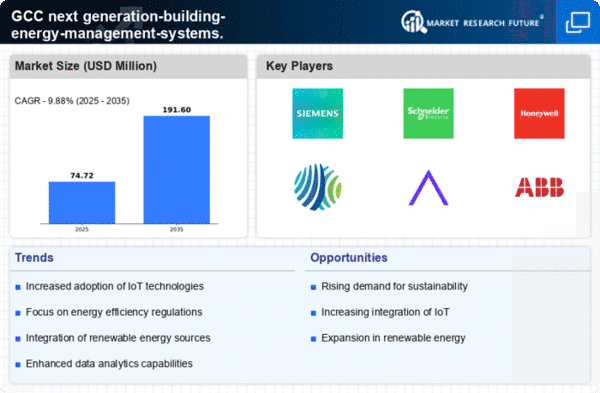Rising Energy Costs
The escalating costs of energy in the GCC region are driving the next generation-building-energy-management-systems market. As energy prices continue to rise, businesses and consumers are increasingly seeking solutions to optimize energy consumption and reduce expenses. This trend is particularly evident in countries like Saudi Arabia and the UAE, where energy costs have surged by approximately 20% over the past few years. Consequently, organizations are investing in advanced energy management systems to monitor and control energy usage effectively. The next generation-building-energy-management-systems market is poised to benefit from this shift, as stakeholders recognize the potential for significant cost savings and improved operational efficiency.
Technological Advancements
Technological advancements are a crucial driver of the next generation-building-energy-management-systems market. Innovations in IoT, AI, and big data analytics are transforming how energy is managed in buildings. These technologies enable real-time monitoring, predictive maintenance, and automated control of energy systems, leading to enhanced efficiency and reduced waste. In the GCC, the adoption of smart building technologies is expected to grow by over 30% in the next five years, reflecting a strong demand for sophisticated energy management solutions. As organizations increasingly leverage these technologies, the next generation-building-energy-management-systems market is likely to expand, offering new opportunities for growth and development.
Increased Focus on Sustainability
The growing emphasis on sustainability among businesses and consumers is propelling the next generation-building-energy-management-systems market. In the GCC, there is a heightened awareness of environmental issues, leading to a demand for solutions that minimize carbon footprints and promote sustainable practices. Companies are increasingly adopting energy management systems to track and reduce their environmental impact. This trend is supported by the GCC's commitment to diversifying its economy and reducing reliance on fossil fuels. As sustainability becomes a core component of corporate strategies, the next generation-building-energy-management-systems market is expected to experience robust growth, driven by the need for eco-friendly energy solutions.
Government Initiatives and Incentives
Government initiatives aimed at promoting energy efficiency and sustainability are significantly influencing the next generation-building-energy-management-systems market. In the GCC, various governments have introduced programs and incentives to encourage the adoption of energy-efficient technologies. For instance, the UAE's Energy Strategy 2050 aims to increase the contribution of clean energy to the total energy mix to 50% by 2050. Such initiatives not only foster a favorable regulatory environment but also stimulate investments in innovative energy management solutions. The next generation-building-energy-management-systems market is likely to thrive as businesses align their strategies with these governmental objectives, thereby enhancing their competitiveness and sustainability.
Integration of Renewable Energy Sources
The integration of renewable energy sources into the energy mix is a significant driver for the next generation-building-energy-management-systems market. The GCC region is witnessing a surge in investments in solar and wind energy, with countries like Saudi Arabia and the UAE leading the charge. The share of renewable energy in the total energy consumption is projected to reach 30% by 2030. This shift necessitates advanced energy management systems capable of optimizing the use of renewable resources and ensuring grid stability. As organizations seek to harness the benefits of renewable energy, the next generation-building-energy-management-systems market is likely to expand, providing innovative solutions to facilitate this transition.
















